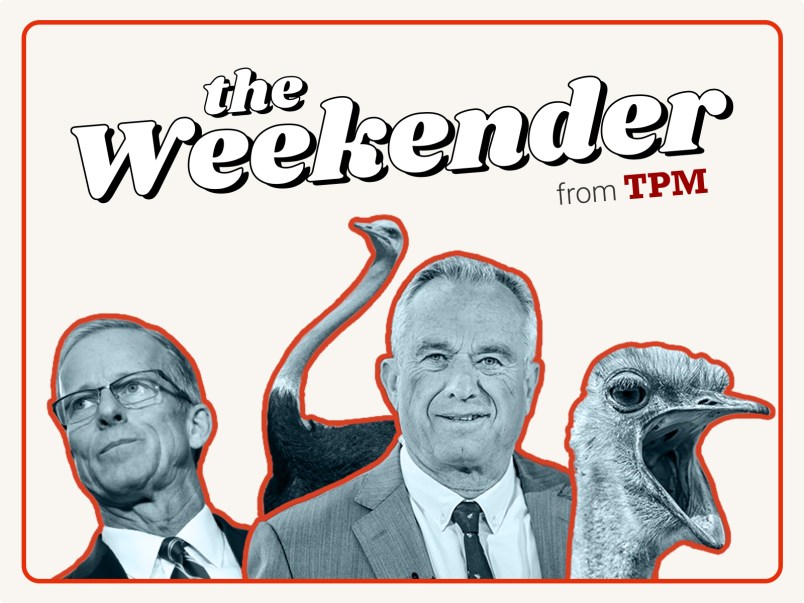The Saga Of RFK Jr., Dr. Oz, And The Possibly Infectious Canadian Ostrich Wobble

Hello it’s the weekend. This is The Weekender ☕️
Secretary of Health and Human Services Robert F. Kennedy Jr. has brought us so much, including sext scandals, bulls**t citations (more on that below), and admittedly bad medical advice. Now, the gravelly voiced political scion wants to bless us with flightless birds that are quite possibly infected with a deadly virus.
The birds in question are about 400 ostriches that are currently living on a farm in Canada’s western British Columbia province. (I was today years old when I learned that a group of ostriches is apparently called a “wobble.”) This particular wobble was hit with a bird flu epidemic last last year that claimed the lives of 69 ostriches. Not very nice.
Given concerns that bird flu, or H5N1, has spread to humans and could cause a major outbreak, officials in Canada have ordered the owners to kill the surviving members of the wobble. (I am taking every opportunity I can to use the word “wobble” here because I find it inherently amusing.)
Karen Espersen and Dave Bilinski, who run Universal Ostrich Farms — which is home to the aforementioned wobble — have pushed back and argued that studying the birds could be beneficial. Most veterinarians and experts do not agree with this take, and the Canadian courts have not either.
The fact scientists see the wobble as a public health threat has not deterred the Canadian right, which has turned the ostriches into something of a cause célèbre. Over on Facebook (of course), Esperson has styled herself as a “digital creator” and “leader in the ostrich industry in Canada.” In between making posts about sleeping among the possibly infected birds, Esperson has tried to amp up her support.
“We need people to come and surround our farm,” Esperson wrote on May 13.
The call to action has apparently resulted in flag-waving busloads reminiscent of the anti-COVID-mandate trucker convoy protests that galvanized the Canadian right prior to its losses in this year’s elections, which were widely seen as a referendum on President Trump. It also inspired some members of the Trump administration to get involved in yet another example of their efforts to connect with the global right wing.
Last week, Kennedy sent a letter to Canadian officials urging them to spare the wobble and study it. Dr. Mehmet Oz, the former reality television star who is Trump’s administrator for the Centers for Medicare & Medicaid Services, took things a step further and offered to house the animals on his massive Florida ranch.
So far, Canada has seemingly remained unmoved by these appeals. For her part, Esperson has tried to co-opt liberal-coded language to bring them on board. Her posts about the standoff included one meme with a bold declaration:
“I IDENTIFY AS OSTRICH”
— Hunter Walker
Here’s what else TPM has on tap this weekend:
- A preview of what Republicans are up against as they prepare to wrestle the Big, Beautiful bill through the Senate.
- A look at the Trump administration’s often comically misguided reliance on AI.
- A suggestion that we take the long view on society’s recent lurch toward ultranationalism and isolationism.
- “We’re all going to die,” Sen. Joni Ernst reminds us.
Let’s dig in.
Thune Is Up
The Senate is preparing to take up the House-passed reconciliation package starting next week.
Senate Majority Leader John Thune (R-SD) will have to coordinate opposing demands for changes to the bill from the senators in his caucus, just as House Speaker Mike Johnson (R-LA) had to in the House. Some are asking for more spending cuts than what the House bill included in order, they say, to shrink the amount by which the bill would increase the deficit. Others are unhappy with the cuts to Medicaid and the rollback of the Biden-era clean energy tax cuts.
Thune can only lose three votes, so he will have to walk a fine line to find a compromise for those in his caucus. But he will also have to avoid making major changes to the package, because those changes would then have to be voted on again by the House. Any change could backfire, breaking the delicate balance on which Johnson spent weeks building the bill.
So far, it is unclear if Senate Republicans will hold committee markup hearings or take the package straight to the Senate floor, where senators would still have the opportunity to make changes. Markup hearings would also mean Democrats could force the members on each committee to take uncomfortable votes on amendments they propose to specific provisions, getting Republicans on the record for their stance around the unpopular cuts to the safety net programs.
“Why would we subject ourselves to a whole bunch of amendments from Democrats when the Republican members in various committees certainly have all the opportunity… to have their say without needing to go through the brain damage of an official markup?” Sen. Kevin Cramer (R-ND) said according to Punchbowl.
We will know more in the coming days, but considering the pushback House Republicans received from the public during their hearings, Senate Republicans could very well skip that step and avoid the spectacle.
— Emine Yücel
It Keeps Happening
In mid May, the Trump administration rolled out its “MAHA report,” a purported effort to get to the bottom of America’s poor health outcomes. The report was cast as a collaboration between various Cabinet secretaries and advisors, including, of course, Robert F. Kennedy, Jr., the secretary of Health and Human Services.
As you likely already know, it now appears that an AI chatbot was among the report’s true authors. The DC news outlet NOTUS first determined on Thursday that many of the studies referenced in the report don’t exist. The report misstated the findings of others. In some cases, the report cited real researchers, but claimed they had authored papers or come to conclusions they had not.
The Washington Post soon sought an answer to the obvious question, and found Chat GPT appears to be at least partially to blame. Some of the URLs cited, the Post found, include “oaicite,” a marker inserted into citations generated by OpenAI, the company behind Chat GPT.
This isn’t the first time the administration has turned to AI to help it complete its work on time, a move more expected of high school students than advisors to the president. DOGE reportedly used a Meta AI model to review federal workers’ Elon Musk-demanded lists of the five things they had done that week. Trump’s mathematically unsound “liberation day” tariffs were widely speculated to be the work of artificial intelligence, making use of a formula that many AI chatbots recommend. “A number of X users have realized that if you ask ChatGPT, Gemini, Claude, or Grok for an ‘easy’ way to solve trade deficits and put the US on ‘an even playing field,’ they’ll give you a version of this ‘deficit divided by exports’ formula with remarkable consistency,” the Verge reported. (Commerce Secretary Howard Lutnick tried to laugh off the possibility AI was involved during a Face the Nation interview.)
Tech CEOs flood us with increasingly dire warnings of what their products will do to our society: AI could wipe out half of all entry-level white collar jobs in five years, Anthropic’s CEO claimed in a round of media appearances this week. But, for now, it appears these products are not quite ready to replace government experts. At least, not with the prompts administration officials have been giving them.
— John Light
Grand Opening, Grand Closing
We might have imagined that, with the rise of the internet and the ability to communicate with anyone, anywhere, we’d move toward a more open, dynamic world. Yet, in 2025, the opposite appears to be the case: a cycle of contraction. In the United States, the Trump administration is clamping down on immigration in the name of border security, safety and “Western values.” Italy’s right-wing government recently restricted immigration, paring back its long-standing Jure Sanguinis policy through which someone — me, for example — could claim citizenship by demonstrating an unbroken chain from my great-grandpa, who emigrated to America, to myself. German Chancellor Friedrich Merz’s Cabinet this week announced its intent to abolish a fast-track-to-citizenship program in an attempt to restrict migration into Germany. Earlier this month, the UK’s Prime Minister Keir Starmer announced the desire to end what he called the “failed experiment in open borders.”
Where to begin? Border security is a fraught issue and the concerns are not exclusive to the right, as Starmer illustrates. But, in the end, we all lose. The demonization of immigrants in the name of safety, or the even greater canard of “protecting culture,” only serves to weaken the human spirit. It becomes more difficult to share wisdom and learn about the rich and glorious constellation of lifeways that exist. We doom people to lives they don’t want to live and foreclose opportunities that may exist elsewhere. It’s easy to forget that the “nation state” as we conceive of it didn’t exist until the 16th century. The indigenous peoples of America used to range for hundreds of miles, learning from and trading with others.
It’s not a given that the world will move, linearly, toward greater and greater interconnectedness and integration, as many predicted just a decade ago. As technological innovation expands our abilities to communicate and to travel, this thinking went, the world should get smaller. Cultures should synthesize and understanding of the other should deepen. But that progress — a word some may take issue with — is anything but linear. If you pick a point in time long ago and compare it to today, it may appear that way. But hidden within the millennia and centuries and decades are cycles of greater and lesser freedom of movement and greater and lesser acceptance of other cultures.
In many ways, recent years see us trending toward a more static, staid way of life. I tend to believe these things are cyclical, this trend won’t last forever. But that doesn’t necessarily help in the short run for those of us alive right now.
— Joe Ragazzo
Words of Wisdom
“Well, we’re all going to die.”
That was Sen. Joni Ernst’s (R-IA) response this week when she was confronted by constituents shouting at her during a town hall that cuts to Medicaid and SNAP would cause people to die.
The Iowans were, of course, referring to the reconciliation package that the House passed last week, adding additional, last-minute Medicaid cuts to appease House Freedom Caucus members who were threatening to sink the bill without steeper cuts to shrink the amount by which the bill would increase the deficit.
Ernst’s response received raucous pushback from the crowd.
“For heaven’s sakes. For heaven’s sakes, folks,” Ernst continued. “What you don’t want to do is listen to me when I say that we are going to focus on those that are most vulnerable. Those that meet the eligibility requirements for Medicaid, we will protect. We will protect them.”
But, as we’ve been reporting, the massive cuts in the bill will lead to millions losing their health care coverage.
— Emine Yücel



